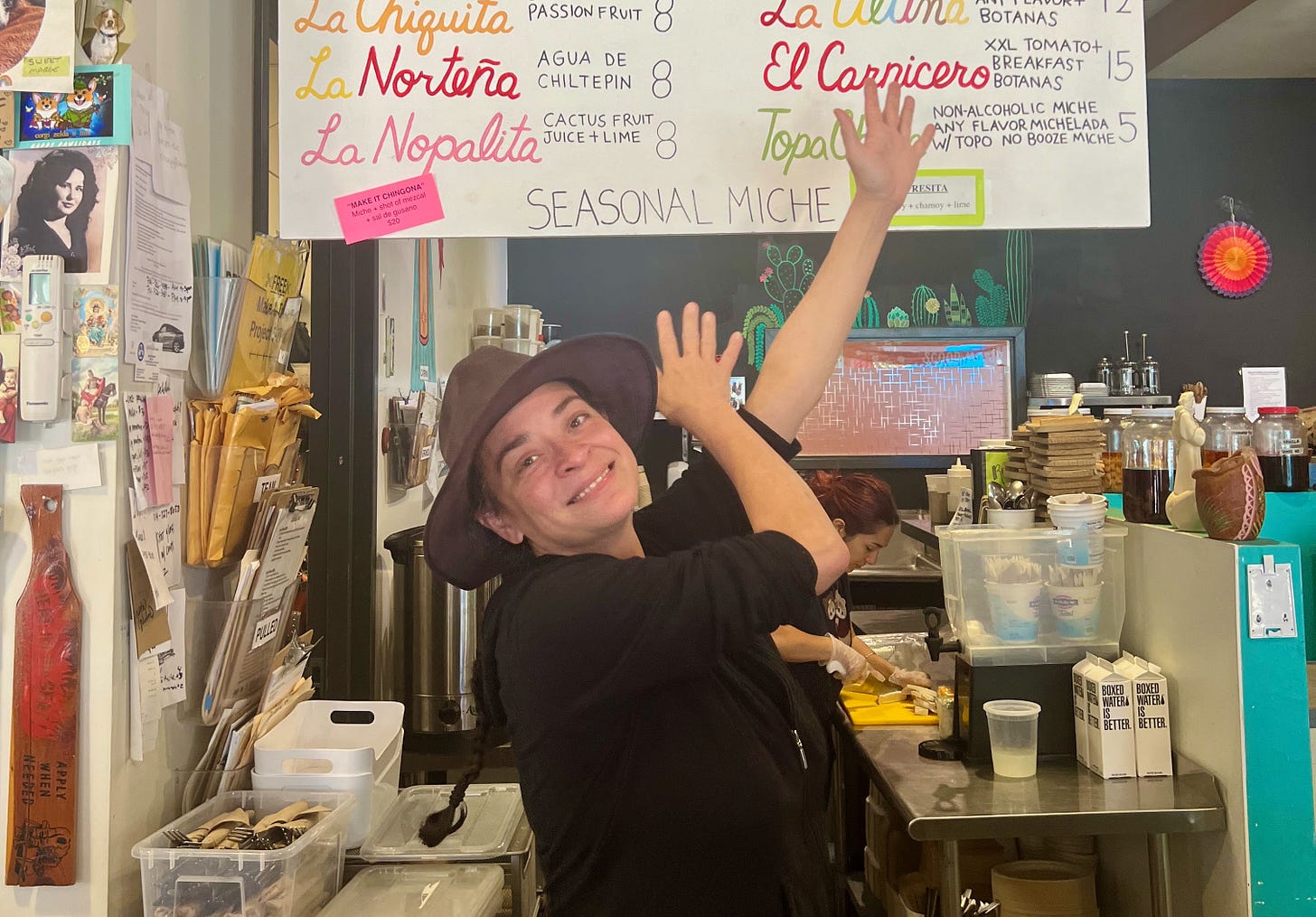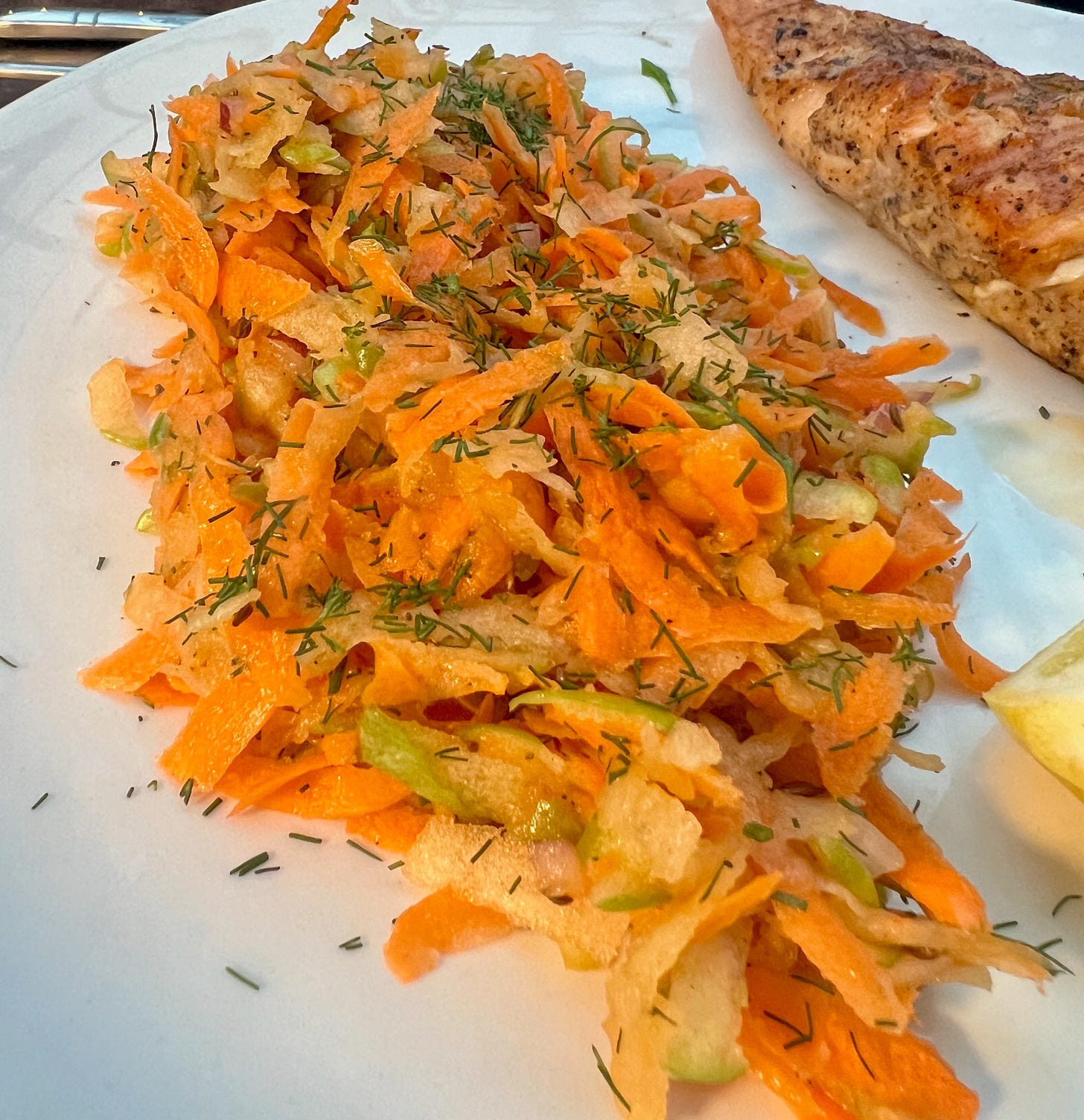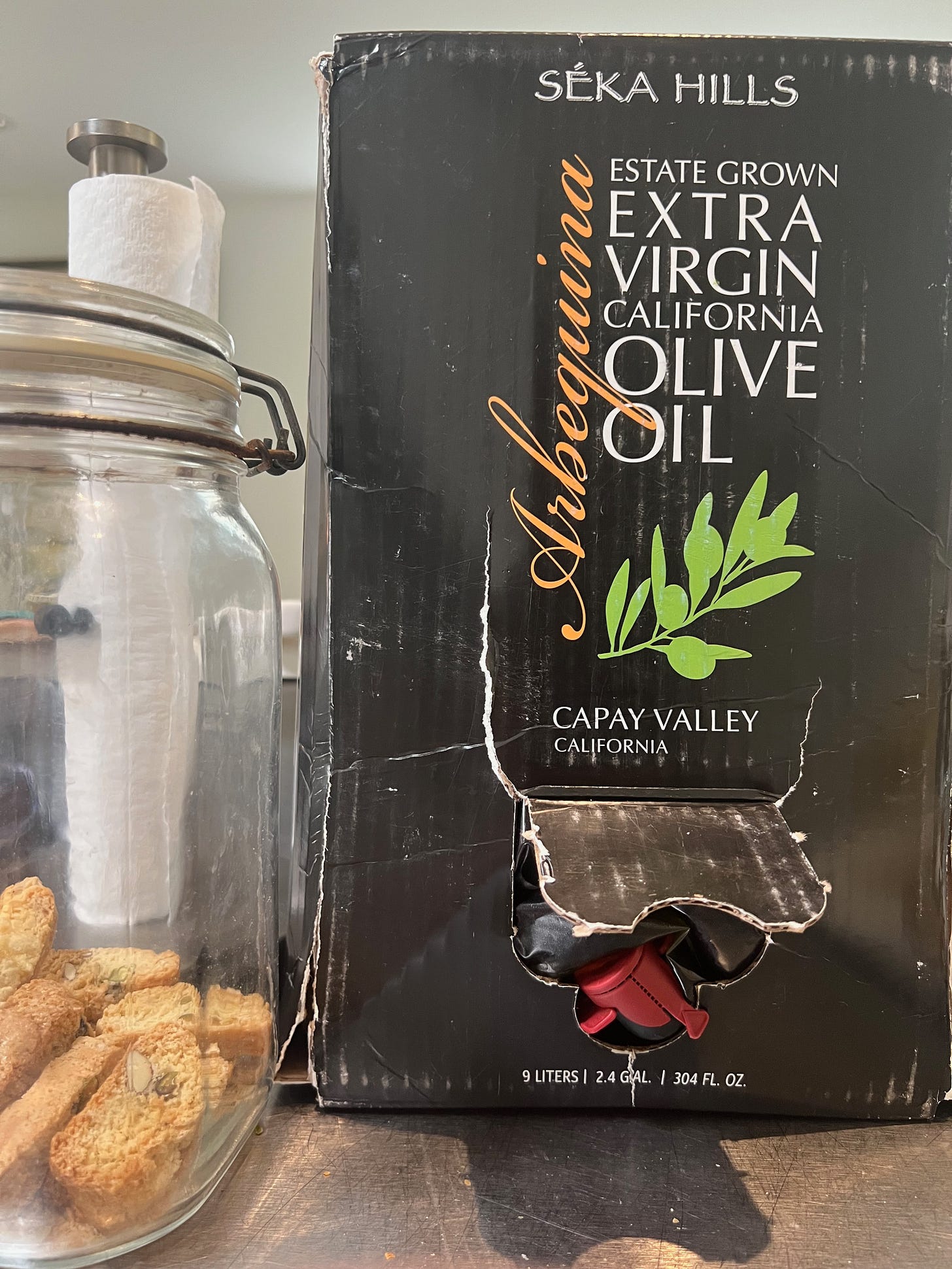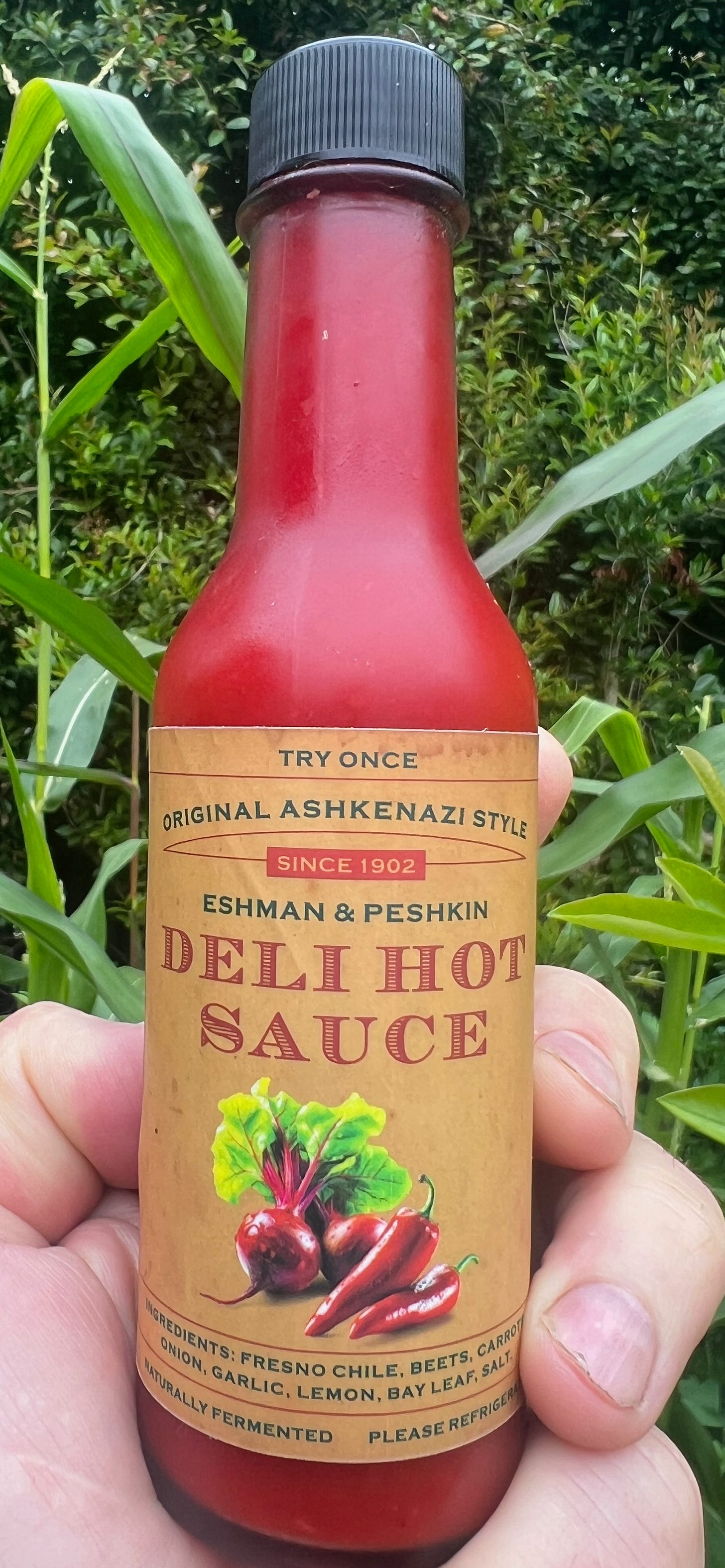At Alta Baja, the way America is supposed to work
I eat lunch, and buy Mexican wine, as the National Guard sets up camp
I drove down to Santa Ana to visit my friend Gustavo Arellano, the Los Angeles Times columnist, and ran into a July 4 story. We met at Alta Baja, his wife Delilah Snell’s cafe and store in the city’s rejuvenated downtown. It’s a kind of wonderland of fresh, inventive food and imported goods from Mexico and the American Southwest. There’s half a wall of Mexican wine, the largest selection in SoCal, they say.
Alta Baja is also a de facto community center, and it had just hosted a tense meeting with the mayor about how the city, whose population is 80 percent Latino, can protect its residents from the immigration raids and arbitrary detentions sweeping through Southern California.
Out of the meeting walked Ryan Chase, whom Gustavo introduced me to as the developer and landlord of the downtown area.
“And he’s Jewish!” Gustavo said.
And that’s the story.
Chase’s great-grandfather was Nathan Fainbarg, a Ukrainian Jewish immigrant who arrived in Santa Ana in 1919 and opened a boot-making shop. Empire Shoes prospered. Fainbarg’s son Allan expanded the business into property development, eventually developing and owning much of downtown.
Chase’s paternal grandparents, Faye and Sol Chase, survived the concentration camps and found a new life in America.
Ryan went into the family business, and when Santa Ana’s downtown fell into an economic downtown, he decided to redevelop it by attracting artists, theatre-owners and food vendors from the community, offering reduced or even subsidized rent to make it work.
“My family's been very blessed from a financial standpoint,” Chase said, “and so we felt an obligation to make an impact on the community.”
Chase has been supportive from the beginning, Delilah told me, with zero guarantees his vision of Santa Ana as the next Austin or Bushwick would work.
“If we can pump some positive impact into this countdown, hopefully we can create jobs, create tax revenue, create positive press, create investment,” Chase said. “That puts us on the map in a positive way.”
Key to that is food. The centerpiece of redevelopment is the 4th Street Market, a factory-sized, early 20th century building anchored by Alta Baja along with Vietnamese and Thai outlets, a kombucha brewer, and a food incubator for small businesses.
“Food was the main driver of all of us” Chase said. “People are starving for something unique.”
It’s taken close to 30 years, and Chase has met with his share of criticism and pushback, but the fears of gentrification and skyrocketing rents pricing locals out haven’t materialized.
Meanwhile Chase, who lives in nearby Irvine and whose family helped found Temple Beth Shalom and the Jewish Community Center, said the Trump administration’s immigration raids have brought fear and intimidation into the community.
After a big fresh salad and a guava Michelada at Alta Baja — and after buying my favorite Baja wine, chocolate and some artisanal tequila — I walked down 4th Street toward the Federal building, where a phalanx of National Guard troops had set up beside their APCs.
I ordered a cajeta latte at Cafecito Cultura and watched as a people made their way uneasily around their new, militarized reality. Later I asked Chase what he felt about the scene.
“I think it's horrible,“ he said. “I have no issue with going after felons. But these are just hard-working, normal people that have been here for a long time, that are members of society, and so, what are we doing? It's created a lot of stress in the community, and rightfully so. My grandparents are immigrants, right?”
1. Sauerkraut, apple and carrot salad at Solidarity
Speaking of the American dream: The late Elina Sidorowicz O’Lague was a Polish immigrant to California who founded what would become Santa Monica’s Solidarity restaurant in 1978. Her daughter Natasha runs it now, and it’s where I ate my birthday dinner July 1. I ordered a Solidarity Salad — a sweet and tart blend of sauerkraut, carrot and apples — along with sauerkraut and mushroom piroshki, cold beet borscht, the only herring I’ve ever liked, a crispy roast duck and crepes filled with apples and cream for dessert. Oh, and a shot of Zubrowka bison grass vodka to toast. The large courtyard at Solidarity is so pleasant on a summer night, the service is familial, and the menu is simply Ashkenazi soul food. I’m not sure why the place isn’t packed every night. Here’s my version of “Solidarity Salad.”
2. Twenty ‘pro-Palestine’ activists before dinner
A few weeks ago, Ahmed Fouad Alkhatib came to our home for Shabbat dinner, exhausted. He explained he had just come from an hours-long taping of a YouTube show called, “Surrounded,” where he sat in the center of a circle of 20 anti-Israel activists and debated them one by one. Ahmed, who was born in Gaza, was dumbfounded by his debate opponents, only one of whom was a Gazan like himself. “Hamas is ISIS,” he said during our dinner. “If these protesters wouldn’t support ISIS, why would they support Hamas?”
The video of that pre-Shabbat dinner melée just dropped. Ahmed’s work for the “Realign for Palestine” campaign seeks to save Palestinians by getting rid of Hamas and pursuing peaceful coexistence with Israel. I get that these videos emphasize conflict to harvest clicks, but the rhetoric the debaters spout, lionizing and justifying Hamas’ brutality, echoes the eliminationist chants on college campuses. Now I understand why Ahmed arrived with an upset stomach. [Read my column]
3. What else is worth reading and eating?
🍋 I discovered Seka Hills Estate Grown Extra Virgin Olive Oil at Alta Baja, where there were small, airplane-friendly bottles near the cash register. It’s simply the best California olive oil I’ve ever had. I took some home, tasted it, then went online and bought 2.4 gallons. Pressed from 2024 olives grown by members of the Yocha Dehe Wintun Nation in Yolo County north of Sacramento, the oil is lush, green and ever-so-slightly biting. The tribe began pressing and bottling the oil in 2011, and now has 25,000 acres under cultivation. It’s pricey, but if you buy in quantity, say $185 for a 2 1/2 gallon carton that uses an airlock technology, the price comes down to 60 cents per ounce, less than bland, supermarket “premium” brands. And if you want the recipe for my homemade biscotti in the photo...
🍋 The cold beet borscht at Solidarity is transformed from blood red to Barbie pink with ice cold buttermilk, then garnished with small cubes of cucumber and radish. It’s so refreshing on a hot summer night that I decided to amend my go-to borscht recipe to include buttermilk.
4. ‘This is my favorite hot sauce’
I naturally ferment organic Fresno peppers, beets, garlic, onion and fresh bay leaves from my garden and lemons to create my Eshman & Peshkin Deli Hot Sauce, which I named after my great-grandfather and his business partner (and brother-in-law), who co-owned a deli in turn-of-the-century Chicago.
When you join Foodaism for the year, I’ll send you a bottle of my incredible hot sauce. When you join Foodaism monthly, I’ll send you my freshly-picked verbena leaves or fresh California bay leaves from my garden. The verbena leaves will be slightly dried but perfect for steeping. Fresh bay leaves will improve your cooking, period. Each week, I’ll send you recipes, stories, videos, restaurant reviews and ideas that connect you to food, tradition, nature, you know, Life. I think you’ll find Foodaism useful, inspiring and thought-provoking. Before you leave, take a second to join Foodaism — and enjoy!










